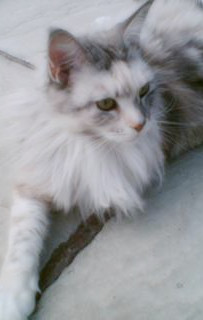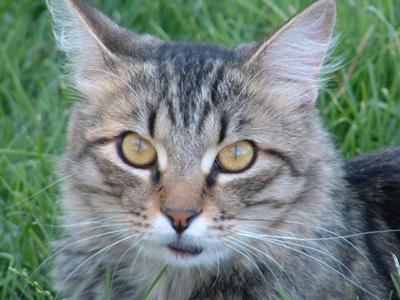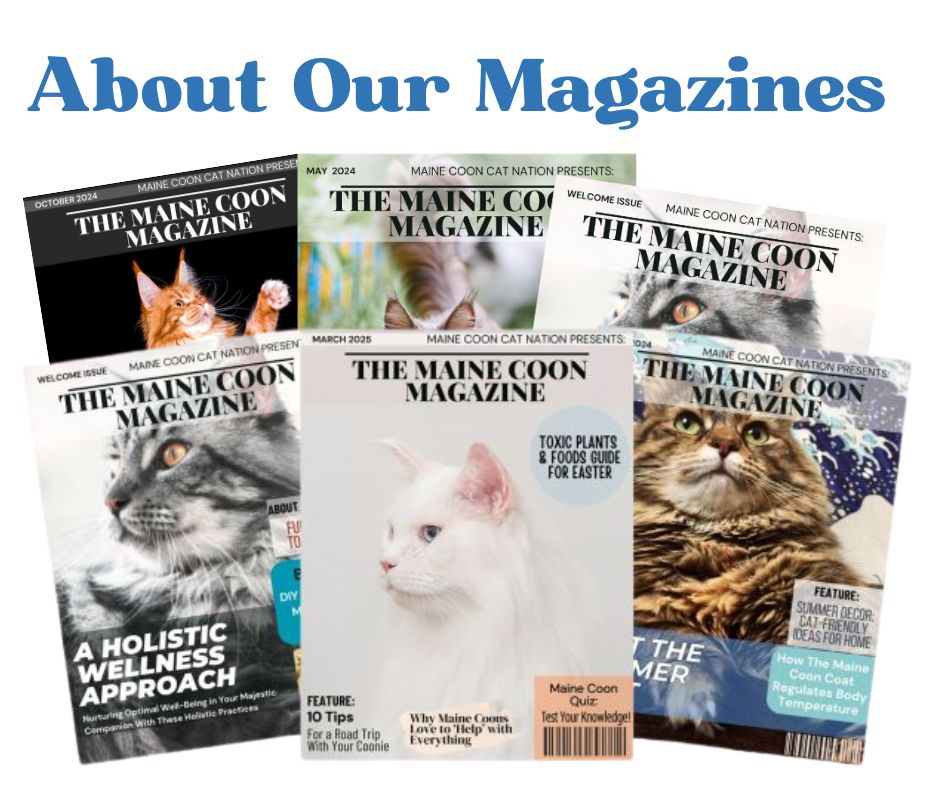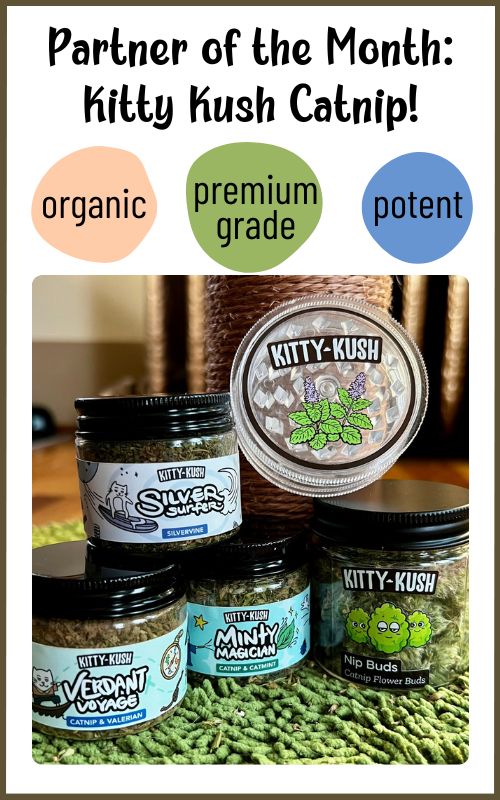- Home
- Maine Coon Cat Health
- Cat Dental Problems
Cat Dental Problems:
Gingivitis, Polyps and More
When it comes to cat dental problems, most of us think of feline gingivitis.
This is one issue, but there are others as well. Even with diligent dental care, cat tooth problems can surface.
 Mississippi the Maine Coon Cat Had Dental Problems
Mississippi the Maine Coon Cat Had Dental ProblemsGingivitis in Cats:
This is what most folks are referring to when they mention cat dental problems. Just like human gingivitis, this is characterized by red, inflamed gums.
They may even be swollen or bleed. Some cats are more prone to gingivitis, just as some people seem to be. It is not particular to any breed - any cat can be afflicted.
As you might have guessed, the best treatment is to brush your cat's teeth. It's not as hard as it sounds!
There are special toothbrushes, meaty-flavored toothpaste, and it can become a quick (and even fun) daily ritual.
It's super important to take care of gingivitis before it descends into periodontal disease.
Tarter and Cleanings
When you visit the vet for your annual check-up, he or she will look at your kitty's teeth. They may have a build-up of tarter.
This is fairly common, especially since most pet owners don't brush their pet's teeth.
When people visit the dentist for their regular cleaning, any tarter gets removed. Well, in order to do this for pets, the procedure involves another separate appointment.
Your cat will most likely undergo anesthesia. Then your veterinarian can clean the teeth and make any extractions, if necessary.
It certainly sounds unpleasant, but rest assured that your beloved friend will feel much better for it. Cats are very good at masking their discomfort.
So even if s/he seems fine, his or her cat dental problems may be causing some pain. It's better to get it taken care of properly.
Lesions, Polyps, Ulcers & Tumors:
 Buster the Maine Coon had a mouth ulcer
Buster the Maine Coon had a mouth ulcerWhen you visit the vet for your annual check-up, he or she will look at your kitty's teeth. They may have a build-up of tarter.
This is fairly common, especially since most pet owners don't brush their pet's teeth.
When people visit the dentist for their regular cleaning, any tarter gets removed. Well, in order to do this for pets, the procedure involves another separate appointment.
Your cat will most likely undergo anesthesia. Then your veterinarian can clean the teeth and make any extractions, if necessary.
It certainly sounds unpleasant, but rest assured that your beloved friend will feel much better for it.
Cats are very good at masking their discomfort. So even if s/he seems fine, his or her cat dental problems may be causing some pain. It's better to get it taken care of properly.

Feline Orthodontic Problems:
Usually we are talking about braces on humans when we mention orthodontic issues, but this one of the cat dental problems to mention!
Although rare in purebred Maine Coon Cats, mixes and other breeds may encounter this.
It is more common in cats with pronounced jaws, like the Persian. The bottom teeth may protrude, possibly becoming visible outside the mouth. Again, proper veterinary treatment will take care of this.
Signs and Symptoms of Cat Dental Problems:
Cats are notoriously good at hiding their pain (it's an instinct so they are not perceived as weak in the wild). You may notice a hesitancy to eat, extra salivation, or occasionally a pawing at the mouth.
Some cats will act hungry, then they won't eat because it is painful.
Some refuse dry food and will only eat canned food - they are sometimes assumed to simply be a finicky eater.
Often there are no signs or symptoms other than the visible problem in the mouth.
Keep an eye out for:
- Hesitancy or reluctance to eat.
- Excessive salivation (drooling).
- Pawing at the mouth.
- Acting hungry but refusing to eat.
- Preferring canned food over dry food (may appear finicky).
- Visible issues in the mouth, such as swelling or redness.
- Often, no outward signs or symptoms beyond what is visible in the mouth.
Cat Dental Problems Can Have A Whole-Body Effect:
When gingivitis is left unchecked, it can progress to periodontal disease. This is marked by irreversible damage to the teeth, their roots and sockets.
The infection eats away at the tooth and enters the bloodstream. There are organs where the infection can then settle: the kidneys, lungs, liver, pancreas and the heart as well as pretty much any organ with a blood supply.
Infection and inflammation of these areas is sometimes traced back to dental disease. All the more reason to avoid cat dental problems!
With regular attention, and proper veterinary care, cat dental problems can be kept in check. And even when a problem arises, as they can do even with the best care, treatment is usually easy and successful.
Many cats start to act like kittens again, after having their cat dental problems taken care of!
« Back to Maine Coon Health
Recent Articles
-
Today's Features
Apr 16, 25 09:54 PM
Today we have two classic Memory Lane pages to share!
Murphy & Candy Cane: Double the Maine Coon Charm - This adorable Maine Coon duo from our 2011 Photo Albums - Murphy and Candy Cane - brought doubl… -
Memory Lane Month Begins!
Apr 15, 25 10:22 PM
We're thrilled to start our "Memory Lane Month" event by visiting some cherished moments from our community! We're in the process of restoring meaningful community stories like this one, to preserve t… -
Will a Maine Coon Protect Its Owner From Danger or an Intruder?
Apr 09, 25 10:41 PM
Plenty of people are curious: Will a Maine Coon protect its owner if something happens? Let’s talk about what this means, and what kind of protector a Coonie is.
References:
PetSmile.org. Retrieved February 22, 2013, from
http://www.petsmile.org/documents/feline_dentistry_guide.pdf
Manhattan Cat Specialists. Retrieved February 22, 2013, from
http://www.manhattancats.com/Articles/Severe%20Gingivitis-Stomatitis.html



